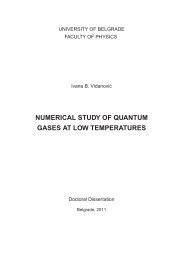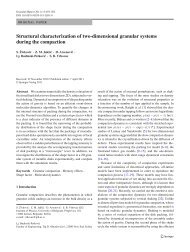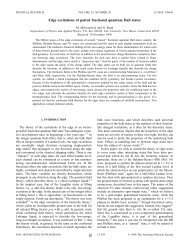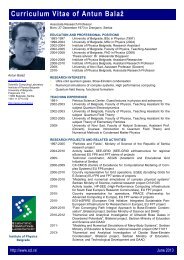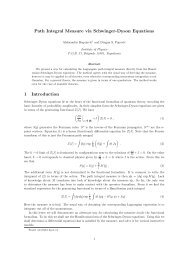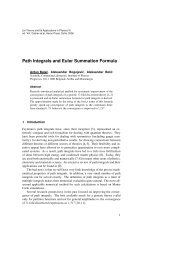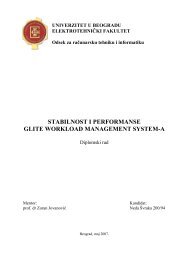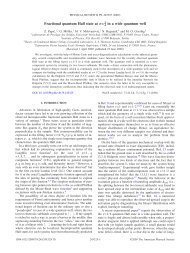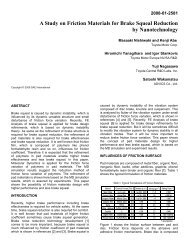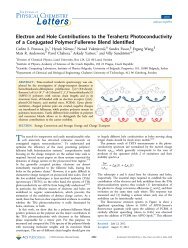- Page 1:
8th Liquid Matter ConferenceSeptemb
- Page 10 and 11:
P1.6Fri 911:10-14:00Structure and d
- Page 12 and 13:
P1.8Fri 911:10-14:00Surface tension
- Page 14 and 15:
P1.10Fri 911:10-14:00Primary relaxa
- Page 16 and 17:
P1.12Fri 911:10-14:00An efficient m
- Page 18 and 19:
P1.14Fri 911:10-14:00The single par
- Page 20 and 21:
P1.16Fri 911:10-14:00Computer simul
- Page 22 and 23:
P1.18Fri 911:10-14:00Porphyrin prep
- Page 24 and 25:
P1.20Fri 911:10-14:00A representati
- Page 26 and 27:
P1.22Fri 911:10-14:00Network of tet
- Page 28 and 29:
P1.24Fri 911:10-14:00Inter-cation c
- Page 30 and 31:
P1.26Fri 911:10-14:00Atomic structu
- Page 32 and 33:
P1.28Fri 911:10-14:00Proline based
- Page 34 and 35:
P1.30Fri 911:10-14:00Magnetic prope
- Page 36 and 37:
P1.32Fri 911:10-14:00On peculiariti
- Page 38 and 39:
P1.34Fri 911:10-14:00Densities of E
- Page 40 and 41:
P1.36Fri 911:10-14:00A molecular dy
- Page 42 and 43:
P1.38Fri 911:10-14:00The lquid-liqu
- Page 44 and 45:
P1.40Fri 911:10-14:00Nanoporous car
- Page 46 and 47:
P1.42Fri 911:10-14:00Computational
- Page 48 and 49:
P1.44Fri 911:10-14:00Medium range f
- Page 50 and 51:
P1.46Fri 911:10-14:00Structural and
- Page 52 and 53:
P1.48Fri 911:10-14:00How strongly i
- Page 54 and 55:
P1.50Fri 911:10-14:00Viscosity of S
- Page 57:
Session 2:Water, solutions and reac
- Page 60 and 61:
P2.2Tue 611:23-14:00Water + tert-bu
- Page 62 and 63:
P2.4Tue 611:23-14:00Experimental ev
- Page 64 and 65:
P2.6Tue 611:23-14:00Trapping proton
- Page 66 and 67:
P2.8Tue 611:23-14:00The effect of r
- Page 68 and 69:
P2.10Tue 611:23-14:00Equation of st
- Page 70 and 71:
P2.12Tue 611:23-14:00Phase transiti
- Page 72 and 73:
P2.14Tue 611:23-14:00Multiscale stu
- Page 74 and 75:
P2.16Tue 611:23-14:00Dipolar solute
- Page 76 and 77:
P2.18Tue 611:23-14:00Statical and d
- Page 78 and 79:
P2.20Tue 611:23-14:00Long-lived sub
- Page 80 and 81:
P2.22Tue 611:23-14:00Water-like ano
- Page 82 and 83:
P2.24Tue 611:23-14:00Study of supra
- Page 84 and 85:
P2.26Tue 611:23-14:00Local thermody
- Page 86 and 87:
P2.28Tue 611:23-14:00Ultrasonic evi
- Page 88 and 89:
P2.30Tue 611:23-14:00The theoretica
- Page 90 and 91:
P2.32Tue 611:23-14:00High frequency
- Page 92 and 93:
P2.34Tue 611:23-14:00Towards a mole
- Page 94 and 95:
P2.36Tue 611:23-14:00Crystallizatio
- Page 96 and 97:
P2.38Tue 611:23-14:00A study of die
- Page 98 and 99:
P2.40Tue 611:23-14:00Virial equatio
- Page 100 and 101:
P2.42Tue 611:23-14:00Compensation e
- Page 102 and 103:
P2.44Tue 611:23-14:00The electric p
- Page 104 and 105:
P2.46Tue 611:23-14:00The hydrophobi
- Page 106 and 107:
P2.48Tue 611:23-14:00Treating hydro
- Page 108 and 109:
P2.50Tue 611:23-14:00Correlations i
- Page 110 and 111:
P2.52Tue 611:23-14:00Hydrogen bond
- Page 112 and 113:
P2.54Tue 611:23-14:00Water structur
- Page 114 and 115:
P2.56Tue 611:23-14:00Rationalizing
- Page 116 and 117:
P2.58Tue 611:23-14:00Collective beh
- Page 118 and 119:
P2.60Tue 611:23-14:00Solute-solvent
- Page 120 and 121:
P2.62Tue 611:23-14:00Anomalous beha
- Page 122 and 123:
P2.64Tue 611:23-14:00The micro-stru
- Page 124 and 125:
P2.66Tue 611:23-14:00Parameterizati
- Page 126 and 127:
P2.68Tue 611:23-14:00Is there a ris
- Page 128 and 129:
P2.70Tue 611:23-14:00Excess entropy
- Page 130 and 131:
P2.72Tue 611:23-14:00Solid/liquid a
- Page 132 and 133:
P2.74Tue 611:23-14:00Percolation li
- Page 134 and 135:
P2.76Tue 611:23-14:00Regularities i
- Page 136 and 137:
P2.78Tue 611:23-14:00A molecular dy
- Page 138 and 139:
P2.80Tue 611:23-14:00Complex phase
- Page 140 and 141:
P2.82Tue 611:23-14:00Understanding
- Page 142 and 143:
P2.84Tue 611:23-14:00Guanidinium in
- Page 144 and 145:
P2.86Tue 611:23-14:00Theoretical st
- Page 146 and 147:
P2.88Tue 611:23-14:00Effects of int
- Page 149:
Session 3:Liquid crystalsP3
- Page 152 and 153:
P3.2Fri 911:10-14:00Studies in Cds-
- Page 154 and 155:
P3.4Fri 911:10-14:00Undulation inst
- Page 156 and 157:
P3.6Fri 911:10-14:00Translation dif
- Page 158 and 159:
P3.8Fri 911:10-14:00Electro-optic r
- Page 160 and 161:
P3.10Fri 911:10-14:00Isotropic to n
- Page 162 and 163:
P3.12Fri 911:10-14:00The influence
- Page 164 and 165:
P3.14Fri 911:10-14:00Tuning diffusi
- Page 166 and 167:
P3.16Fri 911:10-14:00Instability pa
- Page 168 and 169:
P3.18Fri 911:10-14:00Study of new p
- Page 170 and 171:
P3.20Fri 911:10-14:00Stereo-specifi
- Page 172 and 173:
P3.22Fri 911:10-14:00Colloidal part
- Page 174 and 175:
P3.24Fri 911:10-14:00Polymorphism o
- Page 176 and 177:
P3.26Fri 911:10-14:00Computer simul
- Page 178 and 179:
P3.28Fri 911:10-14:00Direct observa
- Page 180 and 181:
P3.30Fri 911:10-14:00Spatio-tempora
- Page 182 and 183:
P3.32Fri 911:10-14:00Continuum theo
- Page 184 and 185:
P3.34Fri 911:10-14:00Isotropic lasi
- Page 186 and 187:
P3.36Fri 911:10-14:00Effect of poly
- Page 188 and 189:
P3.38Fri 911:10-14:00Liquid crystal
- Page 190 and 191:
P3.40Fri 911:10-14:00Multiscale sim
- Page 193:
Session 4:Polymers, polyelectrolyte
- Page 196 and 197:
P4.2Fri 911:10-14:00Experiments and
- Page 198 and 199:
P4.4Fri 911:10-14:00Online monitori
- Page 200 and 201:
P4.6Fri 911:10-14:00Single chain dy
- Page 202 and 203:
P4.8Fri 911:10-14:00Helix specific
- Page 204 and 205:
P4.10Fri 911:10-14:00Exploring the
- Page 206 and 207:
P4.12Fri 911:10-14:00Monte Carlo si
- Page 208 and 209:
P4.14Fri 911:10-14:00Spherical vs p
- Page 210 and 211:
P4.16Fri 911:10-14:00Structural stu
- Page 212 and 213:
P4.18Fri 911:10-14:00The Influence
- Page 214 and 215:
P4.20Fri 911:10-14:00Viscoelasticit
- Page 216 and 217:
P4.22Fri 911:10-14:00Competitive ad
- Page 218 and 219:
P4.24Fri 911:10-14:00Initial steps
- Page 220 and 221:
P4.26Fri 911:10-14:00Diffusion of t
- Page 222 and 223:
P4.28Fri 911:10-14:00Computer simul
- Page 224 and 225:
P4.30Fri 911:10-14:00Slow dynamics
- Page 226 and 227:
P4.32Fri 911:10-14:00Orientation mo
- Page 228 and 229:
P4.34Fri 911:10-14:00Structure and
- Page 230 and 231:
P4.36Fri 911:10-14:00Hierarchically
- Page 232 and 233:
P4.38Fri 911:10-14:00Microphase sep
- Page 234 and 235:
P4.40Fri 911:10-14:00Adsorption of
- Page 236 and 237:
P4.42Fri 911:10-14:00Theoretical an
- Page 238 and 239:
P4.44Fri 911:10-14:00Possible mecha
- Page 240 and 241:
P4.46Fri 911:10-14:00Monte Carlo si
- Page 242 and 243:
P4.48Fri 911:10-14:00Influence of t
- Page 244 and 245:
P4.50Fri 911:10-14:00Application of
- Page 246 and 247:
P4.52Fri 911:10-14:00Lamellae forma
- Page 248 and 249:
P4.54Fri 911:10-14:00Thermorheologi
- Page 250 and 251:
P4.56Fri 911:10-14:00Wrinkling laby
- Page 252 and 253:
P4.58Fri 911:10-14:00Dielectric rel
- Page 254 and 255:
P4.60Fri 911:10-14:00Anomalous stru
- Page 256 and 257:
P4.62Fri 911:10-14:00Effect of addi
- Page 258 and 259:
P4.64Fri 911:10-14:00Large-scale mo
- Page 260 and 261:
P4.66Fri 911:10-14:00On the physica
- Page 262 and 263:
P4.68Fri 911:10-14:00Tuning protein
- Page 265 and 266:
Wed 711:10-14:00P5.1Using symmetry
- Page 267 and 268:
Wed 711:10-14:00P5.3Monte Carlo sim
- Page 269 and 270:
Wed 711:10-14:00P5.5Long-time dynam
- Page 271 and 272:
Wed 711:10-14:00P5.7The role of bou
- Page 273 and 274:
Wed 711:10-14:00P5.9Stability of or
- Page 275 and 276:
Wed 711:10-14:00P5.11Diffusive moti
- Page 277 and 278:
Wed 711:10-14:00P5.13Crystallizatio
- Page 279 and 280:
Wed 711:10-14:00P5.15Collective dyn
- Page 281 and 282:
Wed 711:10-14:00P5.17Calculation of
- Page 283 and 284:
Wed 711:10-14:00P5.19Detection of e
- Page 285 and 286:
Wed 711:10-14:00P5.21Bulk liquid st
- Page 287 and 288:
Wed 711:10-14:00P5.23Charged colloi
- Page 289 and 290:
Wed 711:10-14:00P5.25Dielectric res
- Page 291 and 292:
Wed 711:10-14:00P5.27Colloids in co
- Page 293 and 294:
Wed 711:10-14:00P5.29Phase behavior
- Page 295 and 296:
Wed 711:10-14:00P5.31Mesoscopic the
- Page 297 and 298:
Wed 711:10-14:00P5.33The renormaliz
- Page 299 and 300:
Wed 711:10-14:00P5.35When depletion
- Page 301 and 302:
Wed 711:10-14:00P5.37Confined dryin
- Page 303 and 304:
Wed 711:10-14:00P5.39Predicting cry
- Page 305 and 306:
Wed 711:10-14:00P5.41Competition be
- Page 307 and 308:
Wed 711:10-14:00P5.43Interactions b
- Page 309 and 310:
Wed 711:10-14:00P5.45Electrostatic
- Page 311 and 312:
Wed 711:10-14:00P5.47Homogeneous nu
- Page 313 and 314:
Wed 711:10-14:00P5.49Measuring coll
- Page 315 and 316:
Wed 711:10-14:00P5.51Influence of i
- Page 317 and 318:
Wed 711:10-14:00P5.53Particle dynam
- Page 319 and 320:
Wed 711:10-14:00P5.55Friction contr
- Page 321 and 322:
Wed 711:10-14:00P5.57Monte Carlo si
- Page 323 and 324:
Wed 711:10-14:00P5.59Key role of hy
- Page 325 and 326:
Wed 711:10-14:00P5.61The Kern-Frenk
- Page 327 and 328:
Wed 711:10-14:00P5.63Phase diagram
- Page 329 and 330:
TartagliaWed 711:10-14:00P5.65How s
- Page 331 and 332:
Wed 711:10-14:00P5.67Field induced
- Page 333 and 334:
Wed 711:10-14:00P5.69A modified sof
- Page 335 and 336:
Wed 711:10-14:00P5.71Three dimensio
- Page 337 and 338:
Wed 711:10-14:00P5.73Rod-like parti
- Page 339 and 340:
Wed 711:10-14:00P5.75Diffusion of c
- Page 341 and 342:
Wed 711:10-14:00P5.77Structure form
- Page 343 and 344:
Wed 711:10-14:00P5.79Effective forc
- Page 345 and 346:
Wed 711:10-14:00P5.81Nucleation lin
- Page 347 and 348:
Wed 711:10-14:00P5.83Glass transiti
- Page 349 and 350:
Wed 711:10-14:00P5.85Fluctuation do
- Page 351 and 352:
Wed 711:10-14:00P5.87Deformation an
- Page 353 and 354:
Wed 711:10-14:00P5.89Concentration
- Page 355 and 356:
Wed 711:10-14:00P5.91Investigation
- Page 357 and 358:
Wed 711:10-14:00P5.93Arrest and dyn
- Page 359 and 360:
Wed 711:10-14:00P5.95Two dimensiona
- Page 361 and 362:
Wed 711:10-14:00P5.97Connecting sti
- Page 363 and 364:
Wed 711:10-14:00P5.99Thermodynamic
- Page 365 and 366:
Wed 711:10-14:00P5.101Consolidation
- Page 367 and 368:
Wed 711:10-14:00P5.103Crystallizati
- Page 369 and 370:
Wed 711:10-14:00P5.105Coarse-graini
- Page 371 and 372:
Wed 711:10-14:00P5.107Monolayers of
- Page 373 and 374:
Wed 711:10-14:00P5.109Dissipative t
- Page 375 and 376:
Wed 711:10-14:00P5.111Coarse graini
- Page 377 and 378:
Wed 711:10-14:00P5.113Structure, ph
- Page 379 and 380:
Wed 711:10-14:00P5.115A new model f
- Page 381 and 382:
Wed 711:10-14:00P5.117Dynamics in d
- Page 383 and 384:
Wed 711:10-14:00P5.119Phase behavio
- Page 385 and 386:
Wed 711:10-14:00P5.121Shear melting
- Page 387 and 388:
Wed 711:10-14:00P5.123Driven crysta
- Page 389 and 390:
Wed 711:10-14:00P5.125Patchy, fluor
- Page 391 and 392:
Wed 711:10-14:00P5.127Electrorheolo
- Page 393 and 394:
Wed 711:10-14:00P5.129Clogging and
- Page 395 and 396:
Wed 711:10-14:00P5.131Dynamics of l
- Page 397 and 398:
Wed 711:10-14:00P5.133Anistropic di
- Page 399 and 400:
Wed 711:10-14:00P5.135Equilibrium p
- Page 401 and 402:
Wed 711:10-14:00P5.137Exploring pro
- Page 403 and 404:
Wed 711:10-14:00P5.139Accurate simu
- Page 405 and 406:
Wed 711:10-14:00P5.141Two-particle
- Page 407 and 408:
Wed 711:10-14:00P5.143Attraction be
- Page 409 and 410:
Wed 711:10-14:00P5.145Exact solutio
- Page 411 and 412:
Wed 711:10-14:00P5.147Self-aggregat
- Page 413 and 414:
Wed 711:10-14:00P5.149Kinetics of m
- Page 415 and 416:
Wed 711:10-14:00P5.151Light scatter
- Page 417 and 418:
Wed 711:10-14:00P5.153Frustrated co
- Page 419 and 420:
Wed 711:10-14:00P5.155Colloidal cub
- Page 421 and 422:
Wed 711:10-14:00P5.157Nonequilibriu
- Page 423 and 424:
Wed 711:10-14:00P5.159Numerical stu
- Page 425 and 426:
Wed 711:10-14:00P5.161Aging phenome
- Page 427 and 428:
Wed 711:10-14:00P5.163Depletion att
- Page 429 and 430: Wed 711:10-14:00P5.165Trapping coll
- Page 431 and 432: Wed 711:10-14:00P5.167Electrostatic
- Page 433 and 434: Wed 711:10-14:00P5.169Dynamical sig
- Page 435 and 436: Wed 711:10-14:00P5.171Tomographic c
- Page 437 and 438: Wed 711:10-14:00P5.173Colloidal mic
- Page 439 and 440: Wed 711:10-14:00P5.175Effect of cro
- Page 441 and 442: Wed 711:10-14:00P5.177Fluidization
- Page 443 and 444: Wed 711:10-14:00P5.1792-dimensional
- Page 445 and 446: Wed 711:10-14:00P5.181Thermophysica
- Page 447 and 448: Wed 711:10-14:00P5.183Structure of
- Page 449 and 450: Wed 711:10-14:00P5.185Non-hard sphe
- Page 451 and 452: Wed 711:10-14:00P5.187Freezing beha
- Page 453 and 454: Wed 711:10-14:00P5.189Criticality a
- Page 455: Session 6:Films, foams, surfactants
- Page 458 and 459: P6.2Fri 911:10-14:00Measurement of
- Page 460 and 461: P6.4Fri 911:10-14:00Soap film motio
- Page 462 and 463: P6.6Fri 911:10-14:00Water adsorptio
- Page 464 and 465: P6.8Fri 911:10-14:00Roughness-enhan
- Page 466 and 467: P6.10Fri 911:10-14:00Permeable shel
- Page 468 and 469: P6.12Fri 911:10-14:00Studies on nan
- Page 470 and 471: P6.14Fri 911:10-14:00The theoretica
- Page 472 and 473: P6.16Fri 911:10-14:00Phase diagram
- Page 474 and 475: P6.18Fri 911:10-14:00SAFT-gamma coa
- Page 476 and 477: P6.20Fri 911:10-14:00Buckling, load
- Page 478 and 479: P6.22Fri 911:10-14:00Evaluation of
- Page 482 and 483: P6.26Fri 911:10-14:00Lifetime of bu
- Page 484 and 485: P6.28Fri 911:10-14:00Concentration
- Page 486 and 487: P6.30Fri 911:10-14:00Nascent nanoem
- Page 488 and 489: P6.32Fri 911:10-14:00Surfactant-ass
- Page 490 and 491: P6.34Fri 911:10-14:00Time evolution
- Page 492 and 493: P6.36Fri 911:10-14:00Mixture of PEG
- Page 494 and 495: P6.38Fri 911:10-14:00Charged bilaye
- Page 496 and 497: P6.40Fri 911:10-14:00Microfluidic f
- Page 498 and 499: P6.42Fri 911:10-14:00Interactions o
- Page 500 and 501: P6.44Fri 911:10-14:00Numerical simu
- Page 503 and 504: Thu 811:10-14:00P7.1Dissipative par
- Page 505 and 506: Thu 811:10-14:00P7.3Two-dimensional
- Page 507 and 508: Thu 811:10-14:00P7.5Wall-fluid inte
- Page 509 and 510: Thu 811:10-14:00P7.7Interfacial ten
- Page 511 and 512: Thu 811:10-14:00P7.9Physics of anti
- Page 513 and 514: Thu 811:10-14:00P7.11Diffusion phen
- Page 515 and 516: Thu 811:10-14:00P7.13Water cavitati
- Page 517 and 518: Thu 811:10-14:00P7.15Freezing of si
- Page 519 and 520: Thu 811:10-14:00P7.17Thermodynamics
- Page 521 and 522: Thu 811:10-14:00P7.19Non-equilibriu
- Page 523 and 524: Thu 811:10-14:00P7.21The role of me
- Page 525 and 526: Thu 811:10-14:00P7.23Computational
- Page 527 and 528: Thu 811:10-14:00P7.25Ion specificit
- Page 529 and 530: Thu 811:10-14:00P7.27Raman scatteri
- Page 531 and 532:
Thu 811:10-14:00P7.29Coarse-grained
- Page 533 and 534:
Thu 811:10-14:00P7.31Thickness and
- Page 535 and 536:
Thu 811:10-14:00P7.33Morphological
- Page 537 and 538:
Thu 811:10-14:00P7.35Kinetics of fl
- Page 539 and 540:
Thu 811:10-14:00P7.37Dielectric hea
- Page 541 and 542:
Thu 811:10-14:00P7.39Morphology and
- Page 543 and 544:
Thu 811:10-14:00P7.41The crystal-fl
- Page 545 and 546:
Thu 811:10-14:00P7.43Adsorption of
- Page 547 and 548:
Thu 811:10-14:00P7.45Hard sphere fl
- Page 549 and 550:
Thu 811:10-14:00P7.47Adsorption of
- Page 551 and 552:
Thu 811:10-14:00P7.49Complications
- Page 553 and 554:
Thu 811:10-14:00P7.51New method for
- Page 555 and 556:
Thu 811:10-14:00P7.53Numerical simu
- Page 557 and 558:
Thu 811:10-14:00P7.55Identifying in
- Page 559 and 560:
Thu 811:10-14:00P6.57Free energy of
- Page 561 and 562:
Thu 811:10-14:00P7.59Computing pres
- Page 563 and 564:
Thu 811:10-14:00P7.61Nanofluidics:
- Page 565 and 566:
Thu 811:10-14:00P7.63Calculation of
- Page 567 and 568:
Thu 811:10-14:00P7.65The effect of
- Page 569 and 570:
Thu 811:10-14:00P7.67Adsorption beh
- Page 571 and 572:
Thu 811:10-14:00P7.69Thermal capill
- Page 573 and 574:
Thu 811:10-14:00P7.71Aqueous electr
- Page 575 and 576:
Thu 811:10-14:00P7.73Critical Casim
- Page 577 and 578:
Thu 811:10-14:00P7.75Drag reduction
- Page 579 and 580:
Thu 811:10-14:00P7.77Formation of n
- Page 581 and 582:
Thu 811:10-14:00P7.79Viscous dissip
- Page 583 and 584:
Thu 811:10-14:00P7.81Bouncing jets
- Page 585 and 586:
Thu 811:10-14:00P7.83Pair correlati
- Page 587 and 588:
Thu 811:10-14:00P7.85Shaping liquid
- Page 589 and 590:
Thu 811:10-14:00P7.87On the scaling
- Page 591 and 592:
Thu 811:10-14:00P7.89Adsorption of
- Page 593 and 594:
Thu 811:10-14:00P7.91Experimental s
- Page 595 and 596:
Thu 811:10-14:00P7.93Hexatic phase
- Page 597 and 598:
Thu 811:10-14:00P7.95Spontaneous sp
- Page 599 and 600:
Thu 811:10-14:00P7.97Glass transiti
- Page 601 and 602:
Thu 811:10-14:00P7.99Complex ions i
- Page 603 and 604:
Thu 811:10-14:00P7.101Coaxial cross
- Page 605 and 606:
Thu 811:10-14:00P7.103Ordering beha
- Page 607 and 608:
Thu 811:10-14:00P7.105Theory and si
- Page 609 and 610:
Thu 811:10-14:00P7.107The Saffman-T
- Page 611 and 612:
Thu 811:10-14:00P7.109Grain boundar
- Page 613 and 614:
Thu 811:10-14:00P7.111Unusual capil
- Page 615 and 616:
Thu 811:10-14:00P7.113Motion and os
- Page 617 and 618:
Thu 811:10-14:00P7.115Dissolution b
- Page 619 and 620:
Thu 811:10-14:00P7.117Suspension of
- Page 621 and 622:
Thu 811:10-14:00P7.119Nucleation on
- Page 623 and 624:
Thu 811:10-14:00P7.121Monte Carlo s
- Page 625 and 626:
Thu 811:10-14:00P7.123Forces betwee
- Page 627 and 628:
Thu 811:10-14:00P7.125Size selectiv
- Page 629 and 630:
Thu 811:10-14:00P7.127Structure and
- Page 631:
Session 8:Supercooled liquids, glas
- Page 634 and 635:
P8.2Thu 811:10-14:00Hyperacoustic r
- Page 636 and 637:
P8.4Thu 811:10-14:00Glass transitio
- Page 638 and 639:
P8.6Thu 811:10-14:00Sudden network
- Page 640 and 641:
P8.8Thu 811:10-14:00Metastable high
- Page 642 and 643:
P8.10Thu 811:10-14:00Measurements o
- Page 644 and 645:
P8.12Thu 811:10-14:00Time resolved
- Page 646 and 647:
P8.14Thu 811:10-14:00Freezing of wa
- Page 648 and 649:
P8.16Thu 811:10-14:00Connecting str
- Page 650 and 651:
P8.18Thu 811:10-14:00Multi-scale mi
- Page 652 and 653:
P8.20Thu 811:10-14:00Structure of c
- Page 654 and 655:
P8.22Thu 811:10-14:00Nonlinear stre
- Page 656 and 657:
P8.24Thu 811:10-14:00Bond order in
- Page 658 and 659:
P8.26Thu 811:10-14:00Structure and
- Page 660 and 661:
P8.28Thu 811:10-14:00Connecting dif
- Page 662 and 663:
P8.30Thu 811:10-14:00Vitrification
- Page 664 and 665:
P8.32Thu 811:10-14:00Dynamic hetero
- Page 666 and 667:
P8.34Thu 811:10-14:00A leading mode
- Page 668 and 669:
P8.36Thu 811:10-14:00Factors contri
- Page 670 and 671:
P8.38Thu 811:10-14:00Theoretical st
- Page 672 and 673:
P8.40Thu 811:10-14:00Computer simul
- Page 674 and 675:
P8.42Thu 811:10-14:00Clear structur
- Page 676 and 677:
P8.44Thu 811:10-14:00From ”isomor
- Page 678 and 679:
P8.46Thu 811:10-14:00Presence and a
- Page 680 and 681:
P8.48Thu 811:10-14:00Glass transiti
- Page 682 and 683:
P8.50Thu 811:10-14:00Study of the k
- Page 684 and 685:
P8.52Thu 811:10-14:00Particle corre
- Page 686 and 687:
P8.54Thu 811:10-14:00Activity in su
- Page 688 and 689:
P8.56Thu 811:10-14:00Avalanche exci
- Page 690 and 691:
P8.58Thu 811:10-14:00Effect of size
- Page 692 and 693:
P8.60Thu 811:10-14:00Gauge theory o
- Page 694 and 695:
P8.62Thu 811:10-14:00Phase-separati
- Page 696 and 697:
P8.64Thu 811:10-14:00Quasi-equilibr
- Page 698 and 699:
P8.66Thu 811:10-14:00Bond dynamics
- Page 701 and 702:
Tue 611:23-14:00P9.1Viscosity of su
- Page 703 and 704:
Tue 611:23-14:00P9.3Influence of hy
- Page 705 and 706:
Tue 611:23-14:00P9.5Molecular dynam
- Page 707 and 708:
Tue 611:23-14:00P9.7A microscopic d
- Page 709 and 710:
Tue 611:23-14:00P9.9Rotation and mi
- Page 711 and 712:
Tue 611:23-14:00P9.11A novel optica
- Page 713 and 714:
Tue 611:23-14:00P9.13Evolution of d
- Page 715 and 716:
Tue 611:23-14:00P9.15Stress oversho
- Page 717 and 718:
Tue 611:23-14:00P9.17Effects of a n
- Page 719 and 720:
Tue 611:23-14:00P9.19Modifying defo
- Page 721 and 722:
Tue 611:23-14:00P9.21Efficiently ac
- Page 723 and 724:
Tue 611:23-14:00P9.23Soft matter in
- Page 725 and 726:
Tue 611:23-14:00P9.25Droplet mobili
- Page 727 and 728:
Tue 611:23-14:00P9.27Cell-level can
- Page 729 and 730:
Tue 611:23-14:00P9.29Active microrh
- Page 731 and 732:
Tue 611:23-14:00P9.31Subdiffusive i
- Page 733 and 734:
Tue 611:23-14:00P9.33Dynamics and r
- Page 735 and 736:
Tue 611:23-14:00P9.35Single file di
- Page 737 and 738:
Tue 611:23-14:00P9.37Complex dynami
- Page 739 and 740:
Tue 611:23-14:00P9.39Dynamic approa
- Page 741 and 742:
Tue 611:23-14:00P9.41On mechanism o
- Page 743 and 744:
Tue 611:23-14:00P9.43Peclet number
- Page 745 and 746:
Tue 611:23-14:00P9.45Heat transport
- Page 747 and 748:
Tue 611:23-14:00P9.47Rheology of di
- Page 749 and 750:
Tue 611:23-14:00P9.49Oscillatory fl
- Page 751 and 752:
Tue 611:23-14:00P9.51Scaling equati
- Page 753 and 754:
Tue 611:23-14:00P9.53Transport prop
- Page 755 and 756:
Tue 611:23-14:00P9.55Simulation stu
- Page 757 and 758:
Tue 611:23-14:00P9.57A rheological
- Page 759 and 760:
Tue 611:23-14:00P9.59Limestone fill
- Page 761 and 762:
Tue 611:23-14:00P9.61Incomplete equ
- Page 763 and 764:
Tue 611:23-14:00P9.63Transition mec
- Page 765 and 766:
Tue 611:23-14:00P9.65Nonequilibrium
- Page 767 and 768:
Tue 611:23-14:00P9.67Phase-field mo
- Page 769 and 770:
Tue 611:23-14:00P9.69Enhanced shear
- Page 771 and 772:
Tue 611:23-14:00P9.71Dynamics of th
- Page 773 and 774:
Tue 611:23-14:00P9.73Real-time moni
- Page 775:
Tue 611:23-14:00P9.75Universal diss
- Page 779 and 780:
Tue 611:23-14:00P10.1Mechanical gro
- Page 781 and 782:
Tue 611:23-14:00P10.3Modeling twitc
- Page 783 and 784:
Tue 611:23-14:00P10.5One-step metho
- Page 785 and 786:
Tue 611:23-14:00P10.7Anesthetic mol
- Page 787 and 788:
Tue 611:23-14:00P10.9Electrical res
- Page 789 and 790:
Tue 611:23-14:00P10.11Entropy drive
- Page 791 and 792:
Tue 611:23-14:00P10.13Curvature ind
- Page 793 and 794:
Tue 611:23-14:00P10.15Enhanced diff
- Page 795 and 796:
Tue 611:23-14:00P10.17New approach
- Page 797 and 798:
Tue 611:23-14:00P10.19Spatial struc
- Page 799 and 800:
Tue 611:23-14:00P10.21Cell motility
- Page 801 and 802:
Tue 611:23-14:00P10.23Effect of bou
- Page 803 and 804:
Tue 611:23-14:00P10.25Self-organiza
- Page 805 and 806:
Tue 611:23-14:00P10.27Magnetic bire
- Page 807 and 808:
Tue 611:23-14:00P10.29Swimming beha
- Page 809 and 810:
Tue 611:23-14:00P10.31Hydrodynamica
- Page 811 and 812:
Tue 611:23-14:00P10.33Hydrodynamic
- Page 813 and 814:
Tue 611:23-14:00P10.35Membrane late
- Page 815 and 816:
Tue 611:23-14:00P10.37Protein-prote
- Page 817:
Tue 611:23-14:00P10.39Mesoscale hyd



